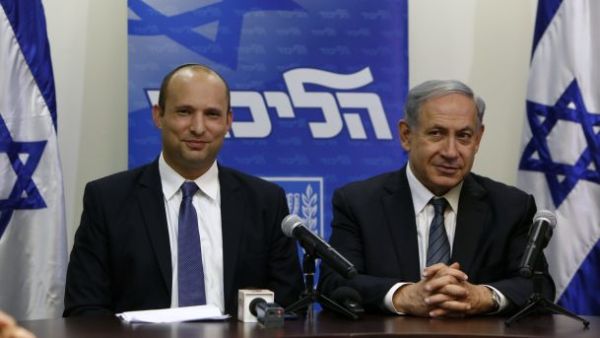Israeli Prime Minister Benjamin Netanyahu is set to expand his right-wing coalition, which currently holds a razor-thin majority in the nation's parliament.
Former foreign minister Avigdor Lieberman, who heads the ultra-nationalist Israel Beiteinu faction, has accepted an offer by Netanyahu to become defence minister, the country's Channel 2 evening news reported, quoting sources close to Lieberman.
There was no immediate confirmation.
Lieberman's acceptance would mean that current Defence Minister Moshe Yaalon, seen as a relative moderate in the otherwise hardline coalition and ruling Likud party, would be ousted from his post.
Netanyahu and Lieberman met late Wednesday afternoon and were expected to meet again later in the evening.
The attempt by the nationalist Israeli premier of the right-wing Likud party to broaden his coalition comes one year and two months after the election.
One year ago, he struggled to form a majority coalition, eventually succeeding to build a coalition with ministers from several parties that had a tiny majority of 61 seats in the 120-seat Knesset, Israel's parliament.
With the far-right Lieberman, the coalition would have 67 seats.
The current Netanyahu government is already the most right-wing in decadesand is devoid of any so-called "fig leaf" party to push for a revival of peace talks with the Palestinians.
Netanyahu, whose Likud has 30 seats and is the largest faction in parliament, has also been trying to bring on board the centre-left Zionist Union of dovish opposition leader Isaac Herzog.
But Herzog held a press conference late Wednesday, announcing the negotiations between him and Netanyahu had reached a dead end.
"I've announced to Netanyahu the end of the negotiations," he said, vowing the opposition "will not grant one day of quiet" to the "crazy" far-right Netanyahu-Lieberman government being formed "in front of our eyes."
Netanyahu should remember May 18 as the day he passed on an "historic opportunity to lead a great change in our lives," he said.
The reference appeared to be to reports that Egyptian President Abdel Fattah al-Sisi was willing to cooperate with Herzog - if appointed foreign minister - on a regional peace conference.
Herzog said he had abstracted "far-reaching" concessions from Netanyahu, but that the premier had refused to put these in writing.
Those concessions, he said, included a veto against Israeli building in the occupied West Bank, a veto against "racist" far-right government-sponsored legislation, Herzog being in full charge of Israel's foreign relations, an immediate immediate revival of peace talks with the Palestinians and the convening of a regional peace conference.
By Ofira Koopmans








